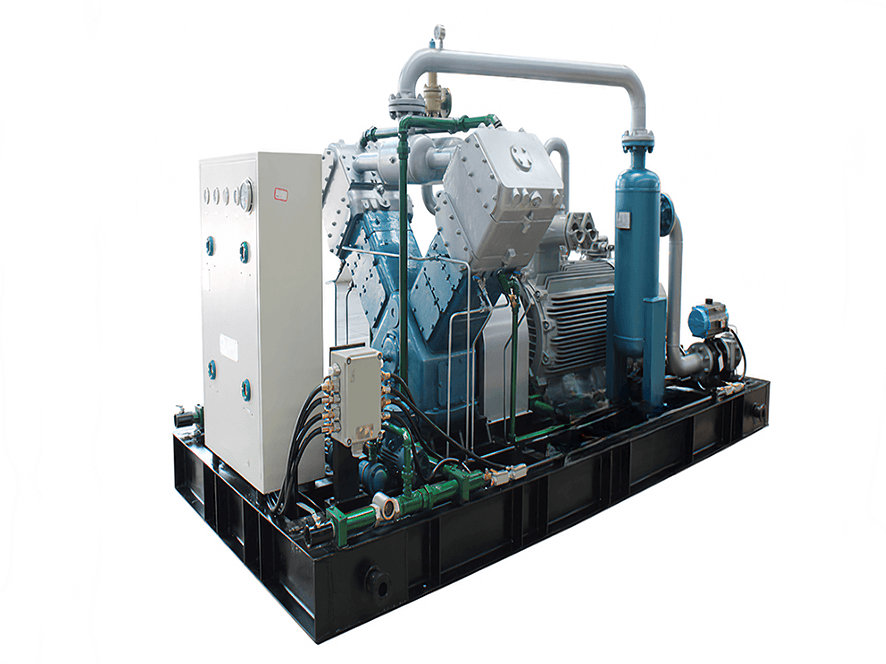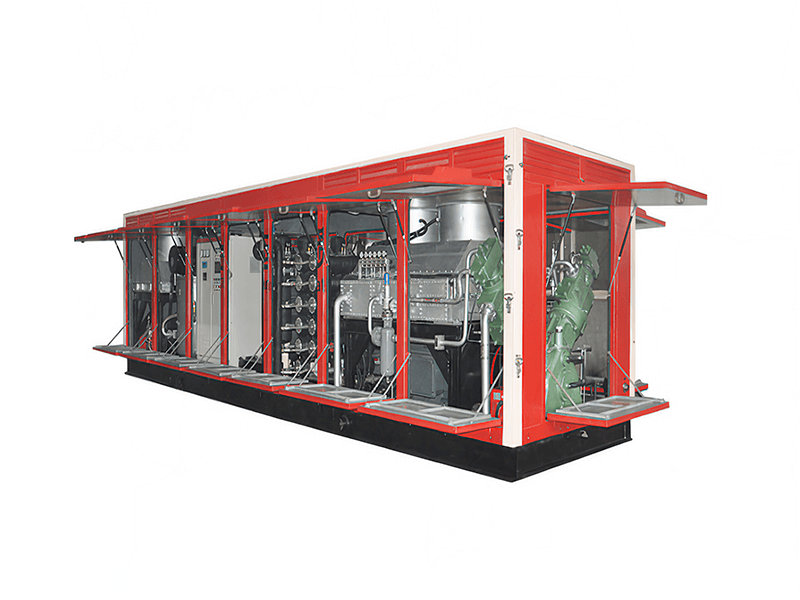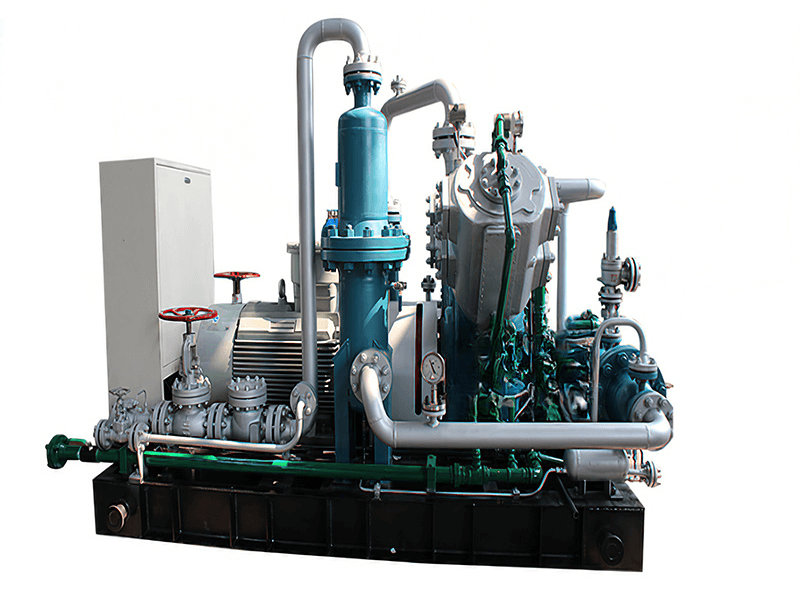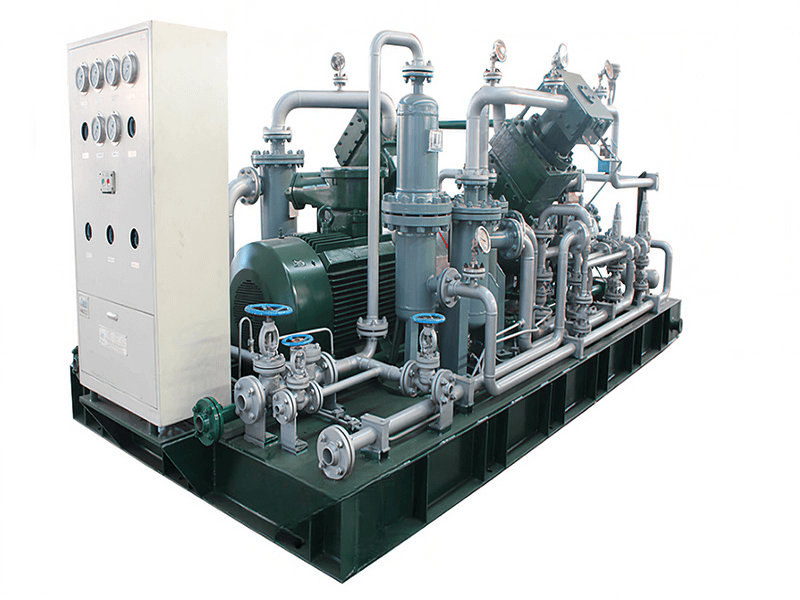Piston gas compressors, also known as reciprocating gas compressors, are a type of gas compressor that uses pistons driven by a crankshaft to compress gas. They are commonly used in various applications where moderate to high pressure is required, such as in industrial processes, natural gas pipelines, refrigeration systems, and more. Here are some key differences between piston gas compressors and other types of gas compressors:
1. Operating Principle:
Piston Gas Compressor operates based on the reciprocating motion of pistons. The gas is drawn into the compression chamber during the suction stroke, and then compressed as the piston moves back to the top during the compression stroke. Other types of gas compressors, such as centrifugal and screw compressors, operate based on different principles like centrifugal force or rotating screws.
2. Pressure Range: Piston gas compressors are well-suited for applications requiring high-pressure compression. They can handle a wide range of pressure ratios and are capable of delivering very high discharge pressures. In contrast, centrifugal compressors are typically used for lower pressure ratios, while screw compressors fall somewhere in between.
3. Size and Capacity: Piston gas compressors are available in a wide range of sizes and capacities, from small units suitable for portable applications to large-scale compressors for industrial use. They can be designed for both low-flow and high-flow applications. Centrifugal compressors are generally larger and more suitable for high-flow applications, while screw compressors are compact and commonly used for medium to high flows.
4. Efficiency: Piston gas compressors can achieve high compression efficiencies, especially when operating at lower pressure ratios. They are known for their good part-load efficiency and can handle variable capacity requirements effectively. Centrifugal compressors are known for high efficiency in continuous high-flow applications, while screw compressors offer good efficiency across a wide range of operating conditions.
5. Maintenance and Service: Piston gas compressors generally require more frequent maintenance due to their reciprocating motion and higher number of moving parts. They may have shorter maintenance intervals and higher maintenance costs compared to centrifugal or screw compressors. However, piston compressors offer the advantage of easier maintenance and repair, as individual components like pistons, valves, and cylinders can be replaced or serviced more easily.

6. Noise and Vibration: Piston gas compressors tend to generate more noise and vibration during operation compared to other types of compressors. Proper noise isolation measures and vibration dampening systems may be required to minimize their impact. Centrifugal compressors and screw compressors typically produce less noise and vibration, making them more suitable for noise-sensitive environments.
7. Control and Modulation: Piston gas compressors offer excellent control and modulation capabilities. They can easily handle varying load demands by adjusting the stroke length or speed of the pistons. This makes them suitable for applications that require precise pressure control and responsiveness. On the other hand, centrifugal compressors and screw compressors may have limited modulation capabilities and are better suited for constant speed operations.
8. Oil Requirement: Piston gas compressors typically require lubricating oil for proper operation, as the piston rings and cylinder walls need lubrication to minimize friction and wear. Some models may also require oil for cooling and sealing purposes. In contrast, centrifugal compressors and some screw compressors are oil-free, making them advantageous in applications where oil contamination is a concern, such as in certain industrial processes or environments.
9. Initial Cost: Piston gas compressors generally have a lower initial cost compared to centrifugal compressors, especially for smaller capacities. They are often more affordable and accessible for smaller-scale applications or operations with budget constraints. However, as the capacity and complexity increase, the cost of piston gas compressors can approach or even exceed that of centrifugal compressors or advanced screw compressors.
10. Maintenance Intervals: Piston gas compressors typically require more frequent maintenance intervals compared to centrifugal compressors and some screw compressors. This is due to the wear and tear associated with the reciprocating motion of pistons and the higher number of moving parts. Regular inspections, lubrication, and component replacements are necessary to ensure optimal performance and longevity.
11. Footprint and Installation: Piston gas compressors generally have a larger physical footprint compared to centrifugal compressors and screw compressors. They require more space for their components, including the crankshaft, cylinders, and associated piping. This can be a consideration when space is limited or when the compressor needs to be integrated into an existing facility.
12. Application Flexibility: Piston gas compressors are versatile and can handle a wide range of gases, including both dry and wet gases. They are suitable for various applications, including those involving gas compression, refrigeration, and air compression. Centrifugal compressors, on the other hand, are better suited for clean, dry gases and are commonly used in large-scale industrial processes. Screw compressors offer good flexibility and can handle a range of gases, making them suitable for a variety of applications.
13. Compression Efficiency: Piston gas compressors can achieve high compression efficiencies, particularly at lower pressure ratios. They are well-suited for applications that require high-pressure compression with relatively low flow rates. Centrifugal compressors, on the other hand, excel at handling large flow rates with moderate pressure ratios, while screw compressors offer good efficiency across a wide range of operating conditions.
14. Starting and Stopping: Piston gas compressors can be started and stopped frequently without significant issues. They can handle frequent start-stop cycles and are suitable for applications that require intermittent operation. Centrifugal compressors typically have limitations when it comes to frequent cycling and are better suited for continuous or semi-continuous operation. Screw compressors fall somewhere in between, offering good flexibility for intermittent or continuous operation.
15. Pressure Control Range: Piston gas compressors offer a wide pressure control range, allowing for precise control over the desired pressure levels. This makes them suitable for applications that require fine-tuning of pressure settings. Centrifugal compressors generally have a narrower pressure control range, making them more suitable for applications with stable pressure requirements. Screw compressors offer good pressure control range, but not as wide as piston compressors.
16. Response to Load Changes: Piston gas compressors have rapid response capabilities, allowing them to quickly adjust to changes in load demand. They can handle sudden increases or decreases in flow rates and pressure requirements. Centrifugal compressors have a slower response time and may require additional equipment or control strategies to handle rapid load changes. Screw compressors offer moderate response times, falling between piston and centrifugal compressors.
17. Size and Portability: Piston gas compressors are available in a wide range of sizes, from small portable units to large industrial compressors. This makes them suitable for applications where portability or space constraints are a consideration. Centrifugal compressors are typically larger and require more space, making them more suitable for stationary installations. Screw compressors offer a compact design, making them suitable for applications where space is limited.
18. Maintenance and Serviceability: Piston gas compressors generally require more frequent maintenance due to the reciprocating motion and higher number of moving parts. However, they are relatively easy to maintain and individual components can be replaced or serviced more easily. Centrifugal compressors and screw compressors require less frequent maintenance but may have higher maintenance costs and more complex servicing requirements.
19. Energy Efficiency: Piston gas compressors can achieve high energy efficiency under specific operating conditions. They are known for their good part-load efficiency and can be more energy-efficient than other types of compressors in certain applications. Centrifugal compressors and advanced screw compressors have their own energy-efficient designs and can offer better overall energy efficiency in specific operating ranges.
When selecting a gas compressor for a specific application, factors such as pressure requirements, flow rates, efficiency considerations, space limitations, and maintenance requirements need to be taken into account. Consulting with compressor manufacturers or experts is recommended to determine the most suitable type of compressor for a particular application.


























